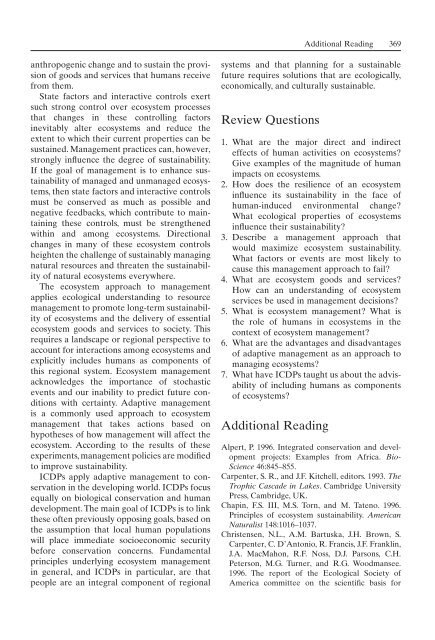Principles of terrestrial ecosystem ecology.pdf
Principles of terrestrial ecosystem ecology.pdf
Principles of terrestrial ecosystem ecology.pdf
Create successful ePaper yourself
Turn your PDF publications into a flip-book with our unique Google optimized e-Paper software.
anthropogenic change and to sustain the provision<br />
<strong>of</strong> goods and services that humans receive<br />
from them.<br />
State factors and interactive controls exert<br />
such strong control over <strong>ecosystem</strong> processes<br />
that changes in these controlling factors<br />
inevitably alter <strong>ecosystem</strong>s and reduce the<br />
extent to which their current properties can be<br />
sustained. Management practices can, however,<br />
strongly influence the degree <strong>of</strong> sustainability.<br />
If the goal <strong>of</strong> management is to enhance sustainability<br />
<strong>of</strong> managed and unmanaged <strong>ecosystem</strong>s,<br />
then state factors and interactive controls<br />
must be conserved as much as possible and<br />
negative feedbacks, which contribute to maintaining<br />
these controls, must be strengthened<br />
within and among <strong>ecosystem</strong>s. Directional<br />
changes in many <strong>of</strong> these <strong>ecosystem</strong> controls<br />
heighten the challenge <strong>of</strong> sustainably managing<br />
natural resources and threaten the sustainability<br />
<strong>of</strong> natural <strong>ecosystem</strong>s everywhere.<br />
The <strong>ecosystem</strong> approach to management<br />
applies ecological understanding to resource<br />
management to promote long-term sustainability<br />
<strong>of</strong> <strong>ecosystem</strong>s and the delivery <strong>of</strong> essential<br />
<strong>ecosystem</strong> goods and services to society. This<br />
requires a landscape or regional perspective to<br />
account for interactions among <strong>ecosystem</strong>s and<br />
explicitly includes humans as components <strong>of</strong><br />
this regional system. Ecosystem management<br />
acknowledges the importance <strong>of</strong> stochastic<br />
events and our inability to predict future conditions<br />
with certainty. Adaptive management<br />
is a commonly used approach to <strong>ecosystem</strong><br />
management that takes actions based on<br />
hypotheses <strong>of</strong> how management will affect the<br />
<strong>ecosystem</strong>. According to the results <strong>of</strong> these<br />
experiments, management policies are modified<br />
to improve sustainability.<br />
ICDPs apply adaptive management to conservation<br />
in the developing world. ICDPs focus<br />
equally on biological conservation and human<br />
development.The main goal <strong>of</strong> ICDPs is to link<br />
these <strong>of</strong>ten previously opposing goals, based on<br />
the assumption that local human populations<br />
will place immediate socioeconomic security<br />
before conservation concerns. Fundamental<br />
principles underlying <strong>ecosystem</strong> management<br />
in general, and ICDPs in particular, are that<br />
people are an integral component <strong>of</strong> regional<br />
Additional Reading 369<br />
systems and that planning for a sustainable<br />
future requires solutions that are ecologically,<br />
economically, and culturally sustainable.<br />
Review Questions<br />
1. What are the major direct and indirect<br />
effects <strong>of</strong> human activities on <strong>ecosystem</strong>s?<br />
Give examples <strong>of</strong> the magnitude <strong>of</strong> human<br />
impacts on <strong>ecosystem</strong>s.<br />
2. How does the resilience <strong>of</strong> an <strong>ecosystem</strong><br />
influence its sustainability in the face <strong>of</strong><br />
human-induced environmental change?<br />
What ecological properties <strong>of</strong> <strong>ecosystem</strong>s<br />
influence their sustainability?<br />
3. Describe a management approach that<br />
would maximize <strong>ecosystem</strong> sustainability.<br />
What factors or events are most likely to<br />
cause this management approach to fail?<br />
4. What are <strong>ecosystem</strong> goods and services?<br />
How can an understanding <strong>of</strong> <strong>ecosystem</strong><br />
services be used in management decisions?<br />
5. What is <strong>ecosystem</strong> management? What is<br />
the role <strong>of</strong> humans in <strong>ecosystem</strong>s in the<br />
context <strong>of</strong> <strong>ecosystem</strong> management?<br />
6. What are the advantages and disadvantages<br />
<strong>of</strong> adaptive management as an approach to<br />
managing <strong>ecosystem</strong>s?<br />
7. What have ICDPs taught us about the advisability<br />
<strong>of</strong> including humans as components<br />
<strong>of</strong> <strong>ecosystem</strong>s?<br />
Additional Reading<br />
Alpert, P. 1996. Integrated conservation and development<br />
projects: Examples from Africa. Bio-<br />
Science 46:845–855.<br />
Carpenter, S. R., and J.F. Kitchell, editors. 1993. The<br />
Trophic Cascade in Lakes. Cambridge University<br />
Press, Cambridge, UK.<br />
Chapin, F.S. III, M.S. Torn, and M. Tateno. 1996.<br />
<strong>Principles</strong> <strong>of</strong> <strong>ecosystem</strong> sustainability. American<br />
Naturalist 148:1016–1037.<br />
Christensen, N.L., A.M. Bartuska, J.H. Brown, S.<br />
Carpenter, C. D’Antonio, R. Francis, J.F. Franklin,<br />
J.A. MacMahon, R.F. Noss, D.J. Parsons, C.H.<br />
Peterson, M.G. Turner, and R.G. Woodmansee.<br />
1996. The report <strong>of</strong> the Ecological Society <strong>of</strong><br />
America committee on the scientific basis for


